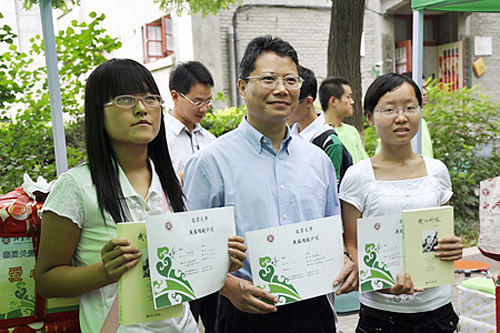|
 |
|
A HELPING HAND: New undergraduates show off financial aid package certificates with their tutor (middle) at Peking University in Beijing on September 3, 2010. The university offered the on-campus guidance services for students suffering from financial difficulties (PKU.EDU.CN) |
It's 6:30 a.m. and the alarm clock rings. Wang Xuejin starts his morning routine. Today is a weekend, but not for him. In ten minutes, he will be biking to work 7.8 km away. He works part-time in editing and planning.
Wang is a student at the Beijing-based Renmin University of China (RUC), one of top ranked universities in China. He comes from a poor family in a rural area of southwest China's Guizhou Province. His tuition is financed by student loans. Part-time jobs pay for his living expenses.
Wang bought himself a suit with his very first paycheck as a freshman. "It's necessary for job interviews," he said. He also studies taekwondo and has a driver's license.
Fortunately, such a hectic lifestyle doesn't affect Wang's studies. He has passed the College English Test (CET) Band 4 and Band 6 and has won a scholarship for excellence. Now he is preparing to take the Test of English as a Foreign Language.
Xu Yan is another college student from a rural area. Compared to Wang, his lifestyle is more relaxed. Every morning, Xu turns on his self-assembled computer and surfs the Internet, chats online and plays games. He seldom leaves his dorm and eats one meal a day. He skips classes. As a result, he can't even remember how many exams he has retaken.
Xu never takes part in school activities. "They cost a lot of money, and I can't afford them. I would rather stay alone," he said.
Although he enjoys freedom in university, Xu feels empty and lacking in direction. "I don't know what I want. This isn't the life I once dreamt of. My family makes me different from those urban students," he said.
Wang and Xu are two typical examples of rural students in urban universities. Some of them are optimistic and full of initiative, and they hope to win more opportunities through hard work. For others, however, rural identity alienates them from their urban peers.
Xu is going to find a job in his hometown as a teacher or a civil servant. He doesn't regret his campus life. "Regret is of little meaning. I just want to go back to the familiar place and I might find who I am," he said.
Counseling comes first
Urban students regard their rural peers as having great initiative and maturity. It goes with a Chinese saying, "Kids from poor families become independent earlier."
Rural students usually live on their own and some even help parents raise their families, according to a student surnamed Zhang who studies history at RUC.
In Zhang's eyes, many of them lack confidence and become sensitive. "At the dorm, we are often cautious about our words when it comes to money," Zhang said.
| 